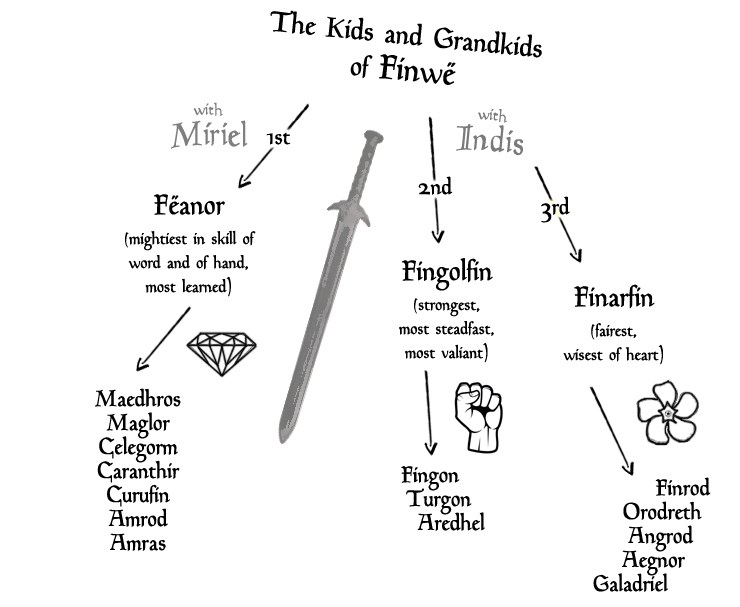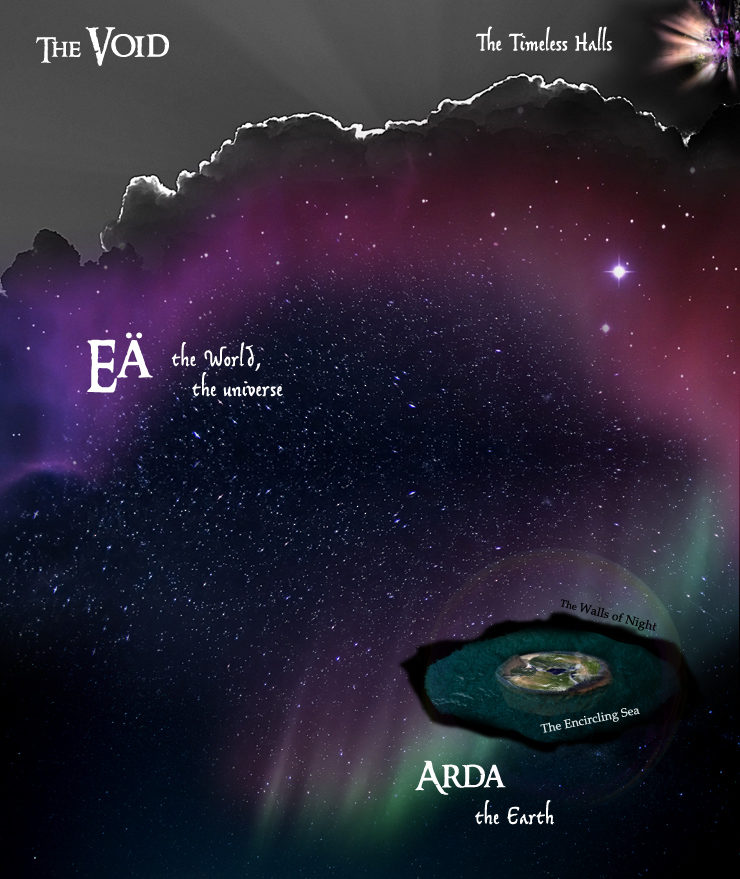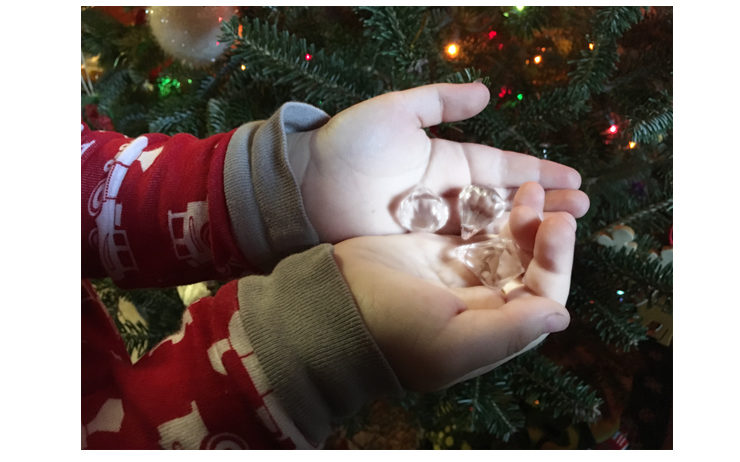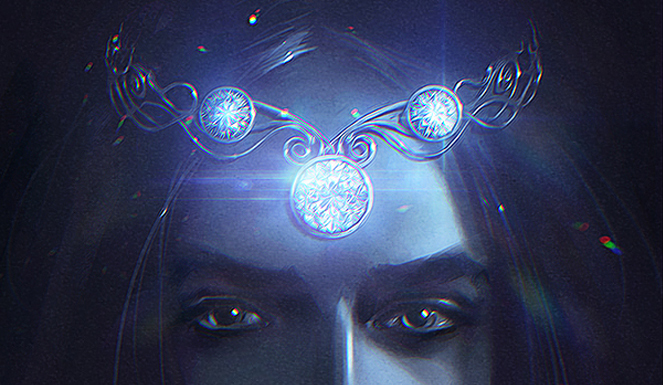In Which the Prize Jewels of the Noldor Are Made, Everyone Gawks, and Melkor Is—Surprise!—Outed As A Big, Big Jerk
In “Of the Silmarils and the Unrest of the Noldor,” we see, at last, the pièce de résistance of all Elvendom. The Silmarils are the reason for the treason and the best excuse for this book’s kick-ass title. How and why they come to be made is a bit mysterious, but then we move right along to see the reactions they elicit in all who behold them—their maker, other Elves, the Valar. Not to mention Melkor. We’ll also learn how everyone’s favorite ex-Vala pisses in the well of paradise, inspires weaponsmithing, and pits brother against brother.
Dramatis personæ of note:
- Fëanor – Noldo, prodigal prince
- Finwë – Noldo, disappointing dad
- Fingolfin – Noldo, righteous prince
- Melkor – Ex-Vala, general asshole
Of the Silmarils and the Unrest of the Noldor
Now that we know who Fëanor is, we’re introduced to his greatest achievement. It is his magnum opus, his masterpiece, his tour de force, the project for which all his other works of utter genius were mere practice, play, or prototype. The narrator speculates that, at the height of his skill and power, it may be that Fëanor had some premonition about the eventual fate of the Two Trees of Valinor, some idea that “Hey, maybe it would be a good idea to find a way to preserve at least some of their light, because hey, you never know what can happen…”
In a non-canon variant of the story in Unfinished Tales, it’s even suggested that the very idea of “imprisoning and blending” such light might have been inspired by Fëanor’s own half niece, Galadriel, whose golden hair looks as though it had “caught in a mesh the radiance of Laurelin.” But I also like to imagine his bedroom wall was plastered with crayon sketches of the Silmarils even at an early age, or at least doodled in the margins of his grade school assignments (written in a script of Fëanor’s own design, of course).
I’m talking, of course, about the making of the Silmarils—three gems “like the crystal of diamonds,” yet made from a mysterious and indestructible material. With this material he’d caught light from both Trees and blended them therein. So these aren’t just cold, inert minerals. They shine with an inner fire—there’s that fiery motif again—and like “living things, they rejoiced in light and received it and gave it back in hues more marvelous than before.” Like a high fantasy version of bioluminescence.
We’re never explicitly told how big the Silmarils are, but as we’ll see them set in jewelry and even held in a hand, so they can’t be much larger than, say, a human’s palm.
To properly understand the impact these literal prize jewels will have on history, it’s important to understand what they really are. First, yes, they’re shiny rocks, not tools or weapons. They’re the most beautiful objets d’art in all of Arda. Objectively. They are the Mona Lisa painted on the ceiling of the Sistine Chapel above the Venus de Milo and inlaid with the Hope Diamond. Only better. Everyone in Aman is impressed, no exceptions. Even Melkor—you know, the guy who thinks Orcs are a good idea—will crave them as part of his ongoing “it’s complicated” relationship with light.
Of course, the Valar are wowed. How can they not be? They’ve been impressed with the Children of Ilúvatar from the get-go and now this paragon among them just made the coolest things ever. They’re OMG amazing—and so the Valar immediately want to get involved, to make the Silmarils even better. That’s what they’re always trying to do, right? Remember, these are the ladies and gents who collaborated to design a little place we call the universe, and then Arda itself. They’re pretty good as a team. Although in this case, it’s really just Varda, the Lady of Stars, who contributes, and then Mandos gets to say some solemn words over them.
Varda hallowed the Silmarils, so that thereafter no mortal flesh, nor hands unclean, nor anything of evil will might touch them, but it was scorched and withered; and Mandos foretold that the fates of Arda, earth, sea, and air, lay locked within them.
There’s a lot going on in that passage, and most of it will unpack itself over time. Remember that there are no mortal Men on the scene yet. But basically, if you’re up to no good and aren’t immortal, you might not want to handle these three objects without proper protective gear. Heck, mere proximity can prove painful. And the fact that Mandos just tosses in his “FYI, those things are totes going to affect everything” is no small thing. We were told in the Valaquenta that he only pronounces dooms at the bidding of Manwë, but I kinda feel like he just pops up here.
Anyway, this seemed odd to me at first, the idea that Fëanor would be okay with anyone—even Varda—tampering with his masterpiece. As a rule, he works alone, and he’s standoffish to the Valar as a rule. But maybe it’s just because he knows Varda will increase the production value of the Silmarils. At no point does he lose sight of the fact that the Silmarils are his alone. She can add her light touch to them, but he probably keeps a Property of Fëanor™ plaque wherever he displays them, just so everyone’s on the same page.

For a while, Fëanor graces everyone’s presence with the Silmarils when he wears them out and about in downtown Tirion. Set in some variety of circlet, he brings them to formal functions which includes, I’m thinking, all dinner parties and game nights. Melkor, who is evidently present at some of these, beholds their splendor and light and is deeply affected, even triggered. His reaction, I suspect, is driven by his long history of seeking in vain for the Flame Imperishable, and of the Lamps, then the Trees, and then his three-age prison sentence in the halls of Mandos.
But wait a moment! Even if Melkor got a hold of a Silmaril, isn’t he clearly “of evil will”? Wouldn’t it scorch him? He sure is, and they sure would. But that’s not going to stop the Ainu whose name means “He who arises in might.” So Melkor hatches his vengeful, two-pronged, and long term scheme: Destroy Fëanor and separate the Elves from the Valar. This he does by sowing lies among the many Noldor who listen to him. Lies about the Valar and why they had brought the Eldar to Aman in the first place.
Like…isn’t it curious that as soon as the Elves showed up on Middle-earth, the Valar went and lured them away from it? What were they afraid of, one wonders? Could it be that the Valar are jealous of the Elves, of the power they’d accumulate if left to their own devices? If left ungoverned? Wouldn’t it benefit the Valar to keep these Elves close like little pets, keep them in check here in Valinor? Keep them in line…
And Melkor also tells some of the Noldor in secret about Men! That’s right, the Valar hadn’t disclosed the coming of Men to the Elves. Uh-oh. You’d think one of the terms of Melkor’s parole would have been be “to keep quiet about the whole Firstborn and Secondborn thing”—not that he’d have kept it.
And now that some are hearing this truth from Melkor—and more importantly, his version of the truth—they really start to wonder: why did the Valar remove them from the Middle-earth? Never mind that a whole bunch of Elves were allowed to just stay there, and did: first the Avari, then various Teleri splinter groups. But I’m guessing Melkor never brings that up. Granted, he was in Mandos State Penitentiary when the Elves were brought over, but he does his homework and obviously knows a lot more than they do.
Melkor even lets slip the idea that Manwë is deliberately holding the Eldar captive in Valinor so that when Men finally show up they’ll be in charge, free from Elven interference. And why? Because Men are going to be a weaker, short-lived, and far-easier-to-control race for the Valar—
Wait a sec. Notice how Men, who haven’t even shown up yet, are already causing problems? Geez. We really can’t get a break, can we?
Melkor’s campaign of slander isn’t quick, and his lies don’t even take at first. The Noldor are, by nature, a fair and friendly people. Remember, these are the ladies and gents who wrought gemstones and then just handed them out freely. You can’t drop straight-up lies among them and watch them spread rapidly like in today’s divisive political landscape. Elves aren’t as corruptible as Men will be, for example—as Sauron will one day discover and exploit in later stories. (See, now I’m doing it.)
But yeah, you’ve really got to work at it to corrupt Elves. Melkor knows better than anyone how to do it (he basically invented lying). It’s not like he’s walking around handing out anti-Valar pamphlets. No, he’s far more subtle than that. He drops a fib here, a little white lie there, and then sprinkles some alternative facts all around. Then he cultivates them until they snowball into truly damaging aspersions. Once something sticks, then it can do its insidious work.
But he that sows lies in the end shall not lack of a harvest, and soon he may rest from toil indeed while others reap and sow in his stead.
So the Noldor do, in time, fall for these lies. Elves love to talk, and Melkor’s “harvest” is the Noldorin game of telephone that finally comes about. Sooner or later, one little mole hill of half-truth spoken to an Elf on this side of the city eventually becomes a Taniquetil-sized falsehood on the other end.
Thus ere the Valar were aware, the peace of Valinor was poisoned. The Noldor began to murmur against them, and many became filled with pride, forgetting how much of what they had and knew came to them in gift from the Valar.
Tragically for everyone, Fëanor falls for this propaganda as well. Partly because Melkor’s a pro, and partly because disdain for the Valar is already a growing component of Fëanor’s pride. Now, had he heard any of these rumors from Melkor’s own lips, Fëanor wouldn’t believe them—he hates that guy. So much. But Melkor has managed to keep his esteemed and upstanding persona well apart from the unrest he is stoking: “nothing of his malice could yet be seen in the semblance that he wore.”
That’s semblance because to spirits of Valar-level power, a body is mere clothing. Melkor hasn’t lost the ability to appear however he chooses. It’s easy enough to put on a poker face when you haven’t got a real face at all. So subtle are Melkor’s ideas that even those Elves who spread them think they’re the ones who came up with them in the first place. And not only do the Noldor start to look askance at the Valar, they start dreaming of ruling their own realms on Middle-earth.
Now all of this is happening in Tirion, the Noldor’s city, where Finwë sits as king with Fëanor as his eldest and the two younger princes, Fingolfin and Finarfin, close at hand. Melkor’s poison-laced whispers impact this royal family as well. All three sons become hypersensitive as to what’s owed to them, and to what they possess; Elf privilege suddenly inflamed by Melkor’s stealthy enablement.
Before we go on, it might be helpful to remember who’s who, and the line of succession.

Now, in spite of all prior evidence, suspicion has wormed its way into Fëanor’s head. He gets to thinking that his brothers must be plotting against him, aiming to seize the leadership of the Noldor. But he is the eldest and so should be next in line…if Finwë should ever step down or ever not be around (for some unimaginable reason). So there really shouldn’t be any problem. Right?
Meanwhile, Fingolfin and Finarfin are left thinking that Fëanor is set on driving them out of the city altogether in order to cement his own inheritance. And with the Noldor thus riled, one Elf house at a time, Melkor starts to nudge all their fine smithing and crafting in a new direction, towards a novel application that had never occured to Elves before: weapons. Thus tools became sharpened, deadly implements of war, forged in secret—swords, spears, and axes mostly—and shields now display the devices of each house. This being the Elf equivalent of feathers puffed up, plumage arrayed, and spikes coming out as a warning to others of their own kind. Melkor’s unrest is achieved. (Although I can’t help but think he’ll later regret encouraging this small arms race, as it’ll also sharpen them against him in the long run.)
I try to remind myself that The Silmarillion is like a history book; it describes the world’s unfolding events mostly in broad strokes and only occasionally zooms in for seminal moments. But what that means is that all this so-called unrest isn’t just the angst of a handful of Elves but of an entire people. Evil is lurking among them, planting seeds, sending up insidious psychological weeds. There could be loads of quiet feuds going on in Noldor homesteads during this time: secret stockpiling, words of warning, sharp looks, and shade thrown. And maybe, most melancholically, some sense of longing towards the east, towards Cuiviénen. Towards Middle-earth.
Many of the Noldor are now wondering: were the Elves even supposed to come here to Valinor in the first place? (It’s ironic, given all the latter-day westward longing we read about in The Lord of the Rings.) Some of the elder Noldor will even remember Middle-earth and how beautiful, if dimmer, it was. But also, Melkor’s put it in their heads that they could be governing realms of their own, instead of sitting here living as subjects in the Valar’s own kingdom. So I do wonder: How many cool stories might be going in during this strange time, wherein the light of the Trees is still suffusing their world with wonder yet Melkor, the greatest threat that ever there was, is dwelling right there among them?
As it is, we’re shown only the words and actions—and then only the most momentous—of the ruling family. Fëanor, of course, makes the best and most “fell” weapons for himself and his seven sons. As another bit of forewarning for what’s coming, we’re told that his father-in-law, the smith Mahtan, is going to regret having taught Fëanor to work with metal at all. Best if that young man had kept to jewelry! But now armed, armored, and properly roused to suspicion and pride, he starts to mouth off openly against the Valar, proclaiming “aloud that he would depart from Valinor back to the world without, and would deliver the Noldor from thraldom, if they would follow him.”
That’s right: Fëanor has come to see his people as mere slaves to the Valar, and he offers to be their Moses and liberate them from these Valinorian pharaohs. A real rabble rouser he has become. For all his haughtiness, he is still charismatic, still the son of the Elf that a whole kindred of Elves followed across the twilit landscapes of Middle-earth and across the Great Sea. It’s no stretch to think they might follow the offspring of such an Elf back, especially one far more outspoken than his father.
Naturally, this is worrisome to Finwë. His favorite and most talented son is spouting crazy talk. Elves as thralls—slaves?!—to the Valar? That they’re captive here in paradise? So Finwë calls for all his lords and advisors to figure out how to calm things down. But arriving before the rest is Fingolfin. He beseeches his dad, asking him to “restrain the pride” of Fëanor, and reminding him that he does still have two loyal sons who aren’t cool with all the anti-Valar trash talk going on.
Fëanor then bursts in, overhearing. He’s armored up and wearing one of these newfangled swords for the first time in public.
‘So it is, even as I guessed,’ he said. ‘My half-brother would be before me with my father, in this as in all other matters.’ Then turning upon Fingolfin he drew his sword, crying: ‘Get thee gone, and take thy due place!’
Even when Fingolfin takes his leave in silence, Fëanor goes after him. At the front gates, in the most public of squares, he corners his half-brother and calls him out again. This time he draws his sword and presses the blade to Fingolfin’s chest. This is HUGE. A naked sword in such a moment is alarming enough, but placing the tip to someone’s heart? As Alan Sisto of The Prancing Pony Podcast puts it in their episode “Trouble In Paradise“:
You pull a gun and put it to somebody’s head, that’s the same thing. He has flat-out threaten this guy’s life.
It may seem mild to readers with grimdark sensibilities, but this is new ground for the Eldar. The very idea of Elf-on-Elf violence is anathema to them, to the Valar, to anyone dwelling in the Bliss of Valinor. But then Fëanor is a groundbreaker, isn’t he? With a weapon bared, he threatens Fingolfin, warning him not to try to usurp him again or he’ll “rid the Noldor of one who seeks to be the master of thralls.”
Oh, snap! That’s not only a clear death threat, that’s an insult to Fingolfin, to the Valar (suggesting they’ve enslaved the Children of Ilúvatar that they love so much and only wanted the best for), and even his father, Finwë. If nothing changes and the status quo remains, this means anyone who’s king here is the king of foolish thralls.
Well, Fingolfin keeps his cool. He’s the most physically valiant of the three sons of Finwë, and the most headstrong; it almost seems surprising that he just accepts Fëanor’s warning, without even retaliatory words.
Two things come from this very public confrontation.
- Melkor’s actions are revealed. To Tulkas and Ulmo, he was always at least a person of interest, but now the truth is laid bare to the rest of the Valar. They had hopes for Melkor, but they’re not idiots. Something was rotten in the state of Eldamar, obviously—and they all know who the culprit must be. They had noticed the rising unrest of the Noldor, the simmering tension, and had even seen that Fëanor was one of its chief players. But the Valar have been contending with Melkor since before the universe was even a thing. And his fingerprints are all over this. He’s the asshole that Valinor maybe deserves, but not the asshole it needs right now.
- Fëanor is called to the Ring of Doom—the Valar’s panel of judgement—the very place where Melkor had been tried and sentenced ages ago when he’d been dragged here in chains. Fëanor is called to answer for the threat he made and for his provocative discontent. The Valar can’t just let this stuff slide. Bad enough if anyone in Valinor did this, but when it’s one of the Noldor’s own princes? Not cool. Not cool at all. Yet this is the same council who unchained Melkor; they are merciful, and the punishment is mere banishment from Tirion for twelve years. That’s Valinorean years, sure, and those are understood to be much longer than solar years (what with there not being a sun yet), but it’s still a mere eye-blink to these immortals. It’s like house arrest, only better.
So off Fëanor goes without a word. The whole episode is reminiscent of Melkor’s first scolding before Ilúvatar back in the Ainulindalë. He took the judgement in silence, and just stews in his own anger. Given the spiritual nature of the Ainur, it might be different, but have you ever seen anyone called out in public, with an audience present, actually apologize for wrongful actions or show regret? Usually that’s when pride is hardened.
Fëanor takes his beloved Silmarils and his sons with him, and they settle into some hills in northern Valinor. Being industrious Noldor, they erect a stronghold—no mere cottage or quaint country house for the likes of Fëanor—called Formenos. He locks up the Silmarils in “a chamber of iron.” Finwë also goes there to join his son in exile, which is a real tragedy. I want to like Finwë; he tries to please everyone and he’s known more sorrow than any Elf ever has, up to this point. But his choice here is regrettable. It’s not tough love he’s giving his son, only jinky fathering. An unhealthy sort of unconditional love. Moreover, he’s shirking his greater responsibilities as the king of the Noldor. His secondborn, Fingolfin, is thus left to lead the Noldor in Tirion. Which you can imagine only pisses off Fëanor all the more.
Meanwhile, and I know I’m just reading between the lines here, but I think Tulkas might be the only resident of Valinor happy about all this. His righteous anger has been validated and now he gets to give Melkor the beat down he’s been dreaming of. Problem is, he can’t find him. Dude is on the lam and he’s had literal ages of practice eluding angry Valar.
Interestingly, now that his evil has been revealed, Melkor seems to assume some sort of cloud-like form, roving the hills of Valinor. Though he’s probably glad of the dupes he’s made out of the Noldor, he’s not so keen on having the Valar aware of his deceits. It’s almost like his rage and defiance get the better of him, and this cloud shape is his tantrum.
Then it seemed to the people of Valinor that the light of the Trees was dimmed, and the shadows of all standing things grew longer and darker in that time.
But one day Melkor refocuses and pays Fëanor a visit in his fairer form. He shows up on the Elf prince’s doorstep and says that he’s looking for someone to share in an adventure…. Err, well, no. Not how he puts it, but it’s also kind of what he’s doing. He wants to team up (for now). Melkor has put on his friendliest face, slapped a fresh coat of silver on his tongue, and is trying to buddy up with Fëanor. Aren’t those sanctimonious Valar just the worst? They just can’t handle the ambitious personalities of right-minded gents like Fëanor and Melkor! The Valar obviously knew Fëanor was on to something, had seen through their bullshit—about the whole Elves-in-thrall thing—so now they’re trying to get rid of him. How typical. He goes on to say:
For am I not Vala also? Yea, and more than those who sit in pride in Valimar; and I have ever been a friend to the Noldor, most skilled and most valiant of the people of Arda.
He encourages Fëanor to come with him. Think of the things these two could do together! And here’s the thing. Melkor’s honeyed words almost work. It’s not that Fëanor believes or even trusts him. He knows better, and he’s always hated him. But Melkor’s words give him pause. Given his predicament, he considers how he can use Melkor (as Melkor would no doubt try to use him) for his own purposes. This could be good for his long term goal of ruling the Noldor and leading them out of Valinor altogether.
But Melkor trips up. When he’s trying to seal the deal, he foolishly mentions the Silmarils, thus tipping his hand just enough for Fëanor to see through him. “He said the S-word!” as the PPP hosts laughingly put it. At this point, Fëanor is hypersensitive about the Silmarils, and now he can see Melkor’s desire for what it is. Incensed by this, Fëanor delivers the greatest line, one that totally deserves the full Shakespeare in the Park kind of treatment:
‘Get thee gone from my gate, thou jail-crow of Mandos!’ And he shut the doors of his house in the face of the mightiest of all the dwellers in Eä.
Y’know, Eä, the entire universe.

No one can accuse Fëanor of being gutless.
As Melkor departs, alone and stormy again, Finwë immediately sends messengers to Manwë. He knows Melkor is a wanted man…Ainu…thing. The messengers reach the Valar and are all like, “Umm, Melkor just showed up on our doorstep. Might want to send someone over…” And so with this tip, Tulkas and Oromë jump up. By the time they get there, the trail is cold. Others had observed lengthening shadows and Melkor’s stormy wake, so they know he’s on the move. Still, it’s no good—they can’t find him.
So the chapter ends on an ominous note. Fëanor is stewing in his stronghold, shut up in his exile with his favorite things in the world—oh, and also his father, and his kids. Melkor is at large but has departed Valinor altogether now, and so the light of the Trees is brighter again.
Things should be all right, but somehow they’re a bit off. They—well, seem fairer and feel fouler, if you understand.
“Spoiler” Alert: Not only do we know the Trees are ill-fated from several references up to this point, but we’re also told early in the chapter that Fëanor will eventually “perish before the Sun was made.” Forecasting the death of, say, a mortal Man wouldn’t be shocking; of course a mortal will die. But for Elves, who theoretically never die, it must mean some serious violence will be thrust upon them. If you’ve never read The Silmarillion before, then at this point you can at least guess at his manner of death.
In the next installment, we’ll finally reach the much-foreshadowed “Of the Darkening of Valinor,” where we’ll see that Melkor finally makes a friend. An awfully scuttly friend.
Top image: “The Silmarils of Fëanor” by Nikulina-Helena
Jeff LaSala is irresponsibly teaching his 3-year-old son to pronounce Silmarillion words and titles. Tolkien nerdom aside, he also wrote a Scribe Award–nominated D&D novel, produced some cyberpunk stories, and now works for Tor Books.











